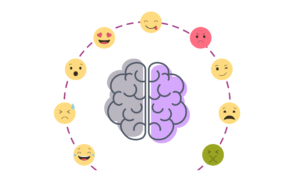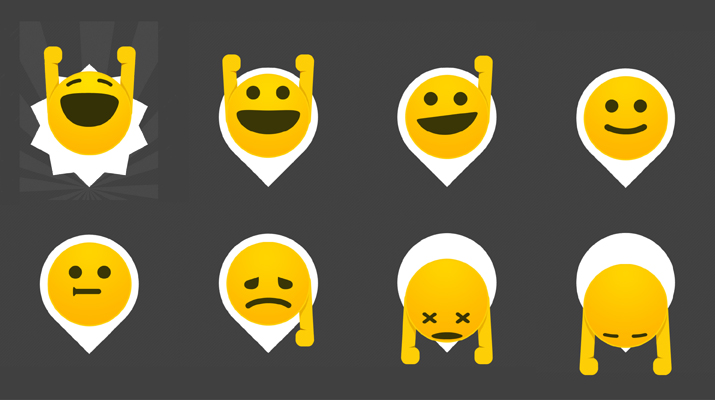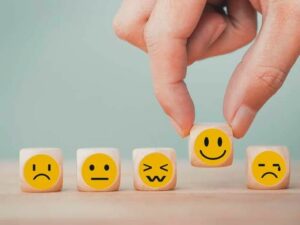In this blog post, we will explore the human psyche and how it affects moods and emotions. We will go in-depth about what they are, how to understand them, and the different types of moods that people experience on a daily basis. This is a topic that often gets behind when discussing psychology but one that can have a major effect on our lives if not understood properly.
Contents
What Are Moods?

The mood is a term that describes the pervasive and temporary affective state of an individual. Moods are typically related to how someone feels about something or some situation.
“In addition, mood can change by many factors such as biological factors such as hormones, sleep deprivation, or illness; environmental factors like lighting or noise levels; cognitive processes such as attention span and information processing styles; interpersonal interactions with other people; and daily events including positive things (e.g., birthdays) and negative things (e.g., accidents).”
The definition of mood is similar to the definition of emotion, but there is a slight difference. Emotions are typically more specific and intense than moods. For example, happiness, sadness, anger, and fear are all emotions. Moods can be happy, sad, angry, or fearful, but they are not as specific or intense as emotions.
What Are Emotions?

Emotions are a type of mood that occurs as a result of the appraisal of an event or experience. The appraisal can be cognitive (e.g., I am happy because I got promoted at work) or somatic (I feel excited because my heart rate is up and my palms are sweaty).
Emotions involve both physiological changes in the body, such as increased heart rate or release of adrenaline, and subjective feelings, such as happiness or sadness.
Types Of Emotions

There are a number of different theories about the types of emotions. However, most theories include four or five basic emotions: happiness, sadness, anger, fear, and disgust.
- Happiness: Happiness is a positive emotion that is associated with feelings of joy, pleasure, and satisfaction. People who are happy tend to be optimistic and have a sense of well-being.
- Sadness: Sadness is a negative emotion that is associated with feelings of unhappiness, grief, and loss. People who are sad often feel down or blue.
- Anger: Anger is a negative emotion that is associated with feelings of hostility and aggression People who are angry often feel irritated or frustrated.
- Fear: Fear is a negative emotion that is interlinked with feelings of apprehension or terror People who are afraid often feel nervous or on edge.
- Disgust: Disgust is a negative emotion that is associated with feelings of repulsion and rejection. People who are disgusted often feel as though something has contaminated them in some way, either physically or morally. This feeling typically leads to avoidance behaviors, such as gagging or spitting out food that might have been tainted by the object causing disgust.
- Moods influence our emotions, which give us information about what’s going on around us and how we should respond emotionally to it.
Role Of Moods And Emotions
Both moods and emotions serve important functions in our lives:
- It is important to remember that moods and emotions are normal and natural parts of the human experience.

- Moods help us to orient ourselves emotionally to our environment.
- Emotions give us information about what is happening around us and how we should respond.
- Moods and emotions are normal and natural parts of the human experience.
- Both moods and emotions play an important role in our lives by helping us to understand our surroundings.
- Moods provide a general emotional orientation, while emotions are more specific feelings that result from the appraisal of an event or experience.
Duration Of Moods And Emotions
The time duration between moods and emotions can vary from person to person. Some people may experience moods and emotions very closely together, while others may have a longer gap between them.
Moods usually precede emotions by a few seconds or minutes. However, there are some cases where emotion may occur first, such as in the case of surprise or fear.
Both moods and emotions play an important role in our lives by helping us understand our surroundings. The time duration between moods and emotions can vary from person to person depending on how quickly they process information emotionally and cognitively.”
How To Talk Through Your Moods And Emotions?
Talking through your emotions is a great way to understand them better and not bottle up negative feelings. Here are some ways you can talk about your emotions:
- Talk it out with someone close by talking will help to make the emotion go away or become less intense, as well as give you more clarity on what’s going on inside of you emotionally.
- Keep a journal – writing down how you feel can be very helpful if done regularly because it allows for self-reflection and insight into different patterns that may emerge over time. ·
- Listen closely when other people speak about their own emotions – this could allow for an opportunity to discuss why certain things have happened in your life at similar times, which might bring greater understanding between both parties.
What To Do When Emotions Overwhelm You?
A few things which might help you when you feel overwhelmed:
- When faced with overwhelming emotions such as grief or anger, it might feel impossible not to react.
- However, it is important to remember that reacting in an unproductive way will only make things worse.
- Instead, try to take a step back and assess the situation objectively.
- Can you do anything about the situation that is causing you distress? If so, then brainstorm possible solutions and take action.
- If the situation is out of your control, then try to accept it and move on. Remember that feelings come and go and eventually the feeling will pass.”
How Do Moods And Emotions affect our Day To Day Life?
Moods and emotions can affect our day-to-day life in a number of different ways.
- If we are feeling sad, we might not feel like interacting with others and might instead want to be alone.
- Alternatively, if we are feeling angry, we might lash out at the people around us.
- Both moods and emotions play an important role in our lives by helping us understand our surroundings.
- Moods usually precede emotions by a few seconds or minutes however there are some cases where emotion may occur first such as in the case of surprise or fear.”
- Moods influence how we feel which gives us information about what’s going on around us and how we should respond emotionally to it.
Conclusion
Understanding our moods and emotions is a key to human behavior. The more we understand the science behind what drives us, the better equipped we are for making decisions that align with our goals and values. Learn how you can use your understanding of cognitive neuroscience principles in day-to-day life by contacting us today.
If you are looking for affordable Online Counseling MantraCare can help: Book a trial therapy session






